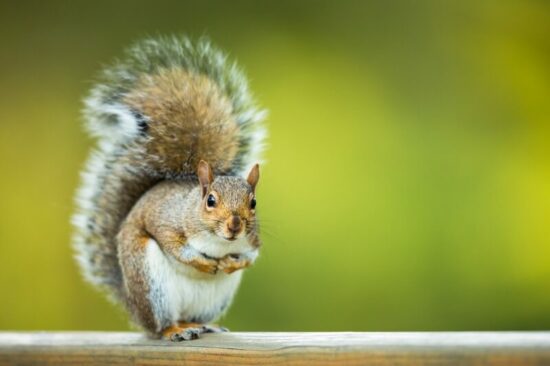Using mothballs to keep squirrels away and deter them from returning to your property is a tactic that’s debated by many homeowners. But interestingly enough, the debate always centers around the effectiveness of the method instead of safety.
This guide covers if mothballs keep squirrels away, and if this is a method you should use on your property.
Table of Contents
Will Mothballs Keep Squirrels Away?
Mothballs are a household staple in many parts of the world. You can buy them at many grocery and big-box stores, making them super accessible.
Traditionally, mothballs are utilized to keep moth larvae out of clothing you keep in storage. Moth larvae are notorious for chewing through natural fibers, leaving clothes you don’t wear often riddled with holes. Toss a few mothballs in the storage container, closet, or chest, and you don’t have to worry about that issue.
Because these little white balls are so effective at keeping moth larvae away, they’ve become the subject of many old wives’ tales and DIY pest control methods. For example, you might hear people recommend using mothballs to keep squirrels away. They say tossing the mothballs around your garden and backyard creates a squirrel-free zone.
But will mothballs keep squirrels away efficiently?
Technically speaking, mothballs can definitely be used to repel squirrels. The small white balls contain powerful fumigant chemicals in solid form. When you place them in your wardrobe or chest, the chemical vapors create a protective sphere of larvae-killing goodness.
The exact mechanics responsible for killing adult and larval moths is what keeps squirrels away. It’s the powerful chemical vapors that do the trick!
When you put moths in an open space, the vapors are free to waft in the air. The scent is the epitome of overbearing. While the smell is relatively manageable for us humans, it’s too much for a squirrel to handle. These creatures have a strong sense of smell that amplifies even the most subtle aroma.
With something that’s already potent like mothballs, it’s downright noxious. Squirrels don’t want to be anywhere near it. They’ll often move out of the area as soon as possible, and they won’t return until the smell is completely gone.
So to put it simply, mothballs can keep squirrels away.
Should You Use This Method To Repel Squirrels?
Just because mothballs can be used to repel squirrels and keep them away, it doesn’t mean you should use them. This method has been fine in the past, but we know a lot more about the effects of mothballs on animals and the environment.
Even though it works, most experts agree that using mothballs isn’t the best idea.
The biggest reason to avoid this age-old pest control trick is that it’s not limited to just affecting squirrels. Every animal that comes across the mothballs will experience adverse effects. Very few animals are immune to that pungent fumigant odor.
Your initial goal might be to keep squirrels out of your garden. But at what costs?
Using the mothballs will eliminate all forms of wildlife from your property. That means birds won’t return to add pops of color to your yard, and those fun sightings of deer or other mammals will be a thing of the past. None of those animals can stand the smell of mothballs.
Even insects will suffer. If mothballs can kill adult insects, imagine what they can do to the beneficial bugs that roam your yard. When you use mothballs to deter squirrels, you can say goodbye to pollinating bees, colorful butterflies, pest-eating spiders, and all the other great forms of life on your property.
Using mothballs to keep squirrels away will do the same for pretty much all other wildlife on your property (if you use enough of them).
If you have pets, you’re also putting them at risk. Cats and dogs can’t bear the smell, either. But it gets worse: Mothballs can be downright lethal!

The chemicals in mothballs can wreak havoc on an animal’s body. They can cause liver and kidney failure as those biological filters try to eliminate the toxins. Death by ingestion is pretty common.
Don’t think that animals will attempt to eat the mothballs? Think again! Accidental ingestion happens all the time. Some animals will eat the stuff just to get rid of the smell.
In some cases, even the vapors will cause damage. Many cats and dogs suffer extreme illness from simply being around mothballs. They’re no joke, and you have to exercise extreme caution.
On top of all that, you have to be wary of children and what they might do. There are far too many risks with mothballs.
But even if you feel like your family and pets are safe, you must consider what the mothballs will do to the environment. Tossing mothballs into the yard with no regard to what happens next is an awful idea. While the balls are solid when you buy them, they slowly dissipate over time.
The balls get smaller and smaller as the chemicals soak into the soil. Once the chemicals are in the earth, they can get into groundwater, ruin ecosystems, and damage plants. In many places, it’s illegal to use mothballs anywhere close to fruit and nut trees. If you have a garden, you can inadvertently poison vegetables, too.
Simply put, there are a number of reasons why it’s not a good idea to use mothballs to deter squirrels and keep them away. Sure, they may be effective, but the potential for negative side effects is substantial.
Chemicals That Are Found In Mothballs
As mentioned earlier, the core ingredient in mothballs is chemical fumigants. Manufacturers use insecticidal chemicals to kill off moths and their larvae.
There are two types of chemicals used in these products.
The first is naphthalene. These days, it’s getting harder and harder to find naphthalene mothballs, and that’s a good thing. They used to be standard, but they’ve fallen out of favor due to the many issues they caused.
Naphthalene is a potent hydrocarbon that typically comes from crude oil or coal. It has a strong aroma and gives off concentrated vapors that can damage the health of humans and animals. Back in the day, many deaths in children and adults were attributed to naphthalene.
You can still get naphthalene mothballs, but they’re usually specialty items reserved for severe moth infestation cases.
The most common chemical in mothballs is paradichlorobenzene. It’s less potent than naphthalene, making it a much safer alternative for modern products. But make no mistake: It can still do plenty of damage.
Breathing in the vapors or ingesting the mothball can cause nausea, vomiting, dizziness, and other unwanted effects. The good news is that symptoms usually subside once the chemical is out of the system hours after exposure.
Both chemicals are not something you want to be around. For this reason, using mothballs to keep squirrels away isn’t a good strategy.
Alternatives To Mothballs For Deterring Squirrels
Since we’ve established that using mothballs to repel squirrels and keep them away is unsafe, it’s helpful to know about some of the alternative methods you can consider using.
Here are a few solutions worth trying.
Natural Spices
The reason why mothballs are so effective at getting rid of squirrels is the smell. Squirrels have sensitive noses, and anything with a strong odor should provide the same results. Instead of using chemicals, why not try aromatic herbs and spices?
Cayenne pepper, garlic, and chili powder are all popular choices for gardeners. You can pick these dried spices up at the dollar store and sprinkle them on your soil. Use the herbs to create a scent barrier to keep squirrels out of a specific area like your garden.
You don’t have to worry about environmental damage or harming the squirrels like you do with mothballs. Spices are entirely safe to use.
Expert Tip: Consider mixing them with petroleum jelly for some staying power. Otherwise, you’ll have to reapply the spices regularly to maintain efficiency.
Essential Oils
Essential oils serve the same purpose as spices. The oils have a strong aroma that most squirrels will want to avoid.
The best oil to use against these creatures is peppermint oil. Typically, anything with a menthol cooling sensation will work. That includes eucalyptus oil.
Add a few drops of oil to a spray bottle of clean water. Give it a good shake and spray the solution liberally around your property. Reapply every few days, and you’ll create a scent barrier that smells wonderful to you, your family, and any guests who come over. This method is significantly better than using mothballs to keep squirrels away.
Homemade Remedies
Here’s a common DIY remedy you can try. This mixture is easy to make and uses something you probably already have in your home: Vinegar.
Vinegar is another strong-smelling liquid that will bother squirrels. Mix one part vinegar with one part water. You’re free to use any vinegar on hand, but apple cider tends to be the most aromatic.
Want to make an extra-potent mix? Add a few chopped jalapenos or garlic to your vinegar and water solution. Spray the solution liberally around your yard, and you’re all set.
Animal Urine
Believe it or not, animal urine is a fantastic solution for dealing with squirrel problems. Urine is readily available at hunting stores. Even though it might seem gross, it’s significantly better than using mothballs to repel squirrels.
For the best results, try using urine from a natural squirrel predator. Fox and wolf urine tend to work best. Apply it around the perimeter of your yard, and squirrels will run the other way to stay safe!
Netting
You can even create a physical barrier to keep squirrels out if all else fails. Mesh netting can work well in some applications. Gardeners like to use it around vegetable patches to prevent hungry squirrels from stealing their precious harvest!
Motion Detection Lights Or Sprayers
Finally, there’s the high-tech route. Motion-activated squirrel repellents are becoming increasingly common. They’re surprisingly effective and humanely deal with squirrel issues.
There are many types of deterrents on the market. You can get systems that activate sprinklers, play audio clips of predator sounds, or turn on lights. Once the sensors detect squirrels in the vicinity, they trigger additional gear to scare the animal off!
Conclusion
Mothballs will keep squirrels away, but the damage and safety concerns that come with using this method make it a bad idea.
If you have any questions about this form of pest control, ask away! We’ll respond to your questions as soon as we can.


